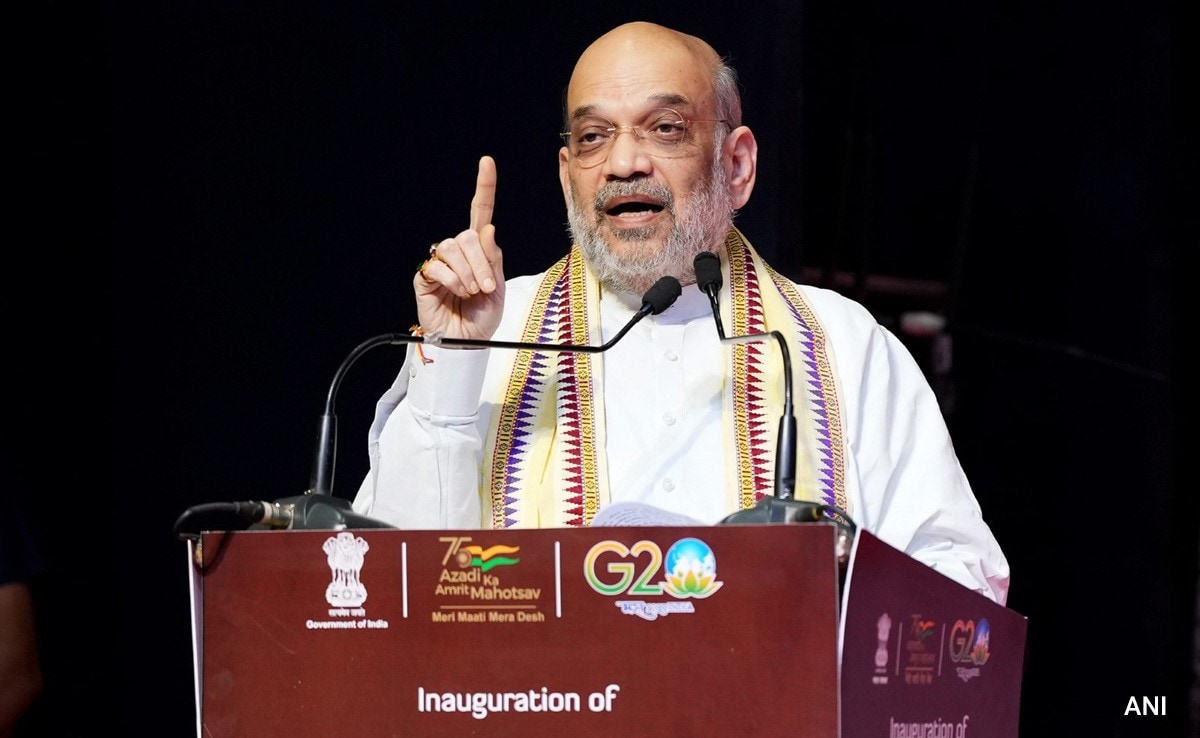
Amit Shah assumed charge as the first Cooperation Minister in 2019. (File)
Mumbai:
Union minister Amit Shah on Saturday said the cooperative sector is not irrelevant even today but it was hurt by political interference in the past, and its future is bright.
Delivering the Laxmanrao Inamdar Memorial Lecture at Mumbai University here, the Union Home and Cooperation Minister said that Prime minister Narendra Modi infused fresh life in the cooperative movement by carving out a separate Cooperation Ministry.
Mr Shah assumed charge as the first Cooperation Minister in 2019.
He said the Union government is going to take many new steps in the cooperative sector in the coming days.
Cooperative movement is the only economic model where “the smallest of the smallest person” can contribute to the development of the country with the least amount of capital, he said.
“Do not even by mistake assume that cooperative (sector) has become irrelevant. I can say this with confidence that cooperative (sector’s) future is bright,” Mr Shah said.
After independence, the cooperative movement made a commendable effort to provide a model that bridged the gap between the socialist and capitalist economic models, Mr Shah said.
In its early days, many individuals worked towards providing a new direction and ethos to the cooperative sector, he said.
“But after 1960 and especially after 1967, political interference started increasing in the cooperative sector….the country’s economy got some jolts, there were downturns, which hurt the cooperative movement,” Mr Shah added.
He listed a series of steps the new ministry has taken with an aim to boost rural and agricultural growth.
In the next five years, three lakh Primary Agricultural Credit Societies (PACS) will be formed and every panchayat will have a PACS, the minister said.
The role of PACS will be multi-dimensional and it can discharge functions of dairy, fishermen society, run a petrol pump, cooking gas agency and even cheap foodgrain and medical shops, he said.
“We have made PACS viable by adding 20 more activities. Model bye-laws (related to PACS) were sent to the states. Twenty-three parties have accepted the model bye-laws irrespective of party politics,” he added.
A multi-state organic cooperative society has been formed to buy organic produce and sell at a higher price in the international market. A multi-state export cooperative was formed to export farmers’ produce and the profits now reach the farmers. A multi-state seed cooperative society was also formed, Mr Shah said.
With regard to Urban Cooperative Banks, Mr Shah said the government raised the problem of settlement with the Reserve Bank.
Now Urban Cooperative Banks have been given the right to do settlement. Along with this, Urban Cooperative Banks will now be able to open new branches, create bank mitras, open micro ATMs and their limit for giving residential loans has also been doubled, Mr Shah said.
For the first time after independence, the government has brought both cooperatives and corporates on the same level in terms of income tax, the minister said.
“If we take forward the activities of cooperatives by combining them with modern technology in tune with the changing times, there is no better way to develop the economy and boost employment generation in a country like India,” Mr Shah said.
Cooperation is a human-centric model where people with minimum capital can contribute to the economy by coming together and compete with those who have access to more funds, he said.
The Modi government has brought into mainstream some 60 crore people who did not have bank accounts and were part of the informal economy, Mr Shah said.
To enable these 60 crore people to contribute to the development of the country, to advance women-led development, and stop the migration from villages to cities, cooperatives are the best model, he said.
The cooperative movement must absorb modern technologies, he said, adding that “mass production and production by masses” is required.
The memorial lecture had been organised in association with Sahakar Bharati, a co-operative body founded by Lakshmanrao Inamdar, a Rashtriya Swayamsevak Sangh (RSS) leader.
Inamdar was the only person in the cooperative sector who was neither a member nor an office-bearer of any cooperative society but contributed significantly to the movement, Mr Shah said.
Earlier in the day, Mr Shah visited the Lalbaughcha Raja Ganesh pandal in the city and also offered prayers to the Ganesh idols installed at ‘Varsha’ and ‘Sagar’, the official residences of Maharashtra Chief Minister Eknath Shinde and Deputy Chief Minister Devendra Fadnavis, respectively.
(Except for the headline, this story has not been edited by NDTV staff and is published from a syndicated feed.)




